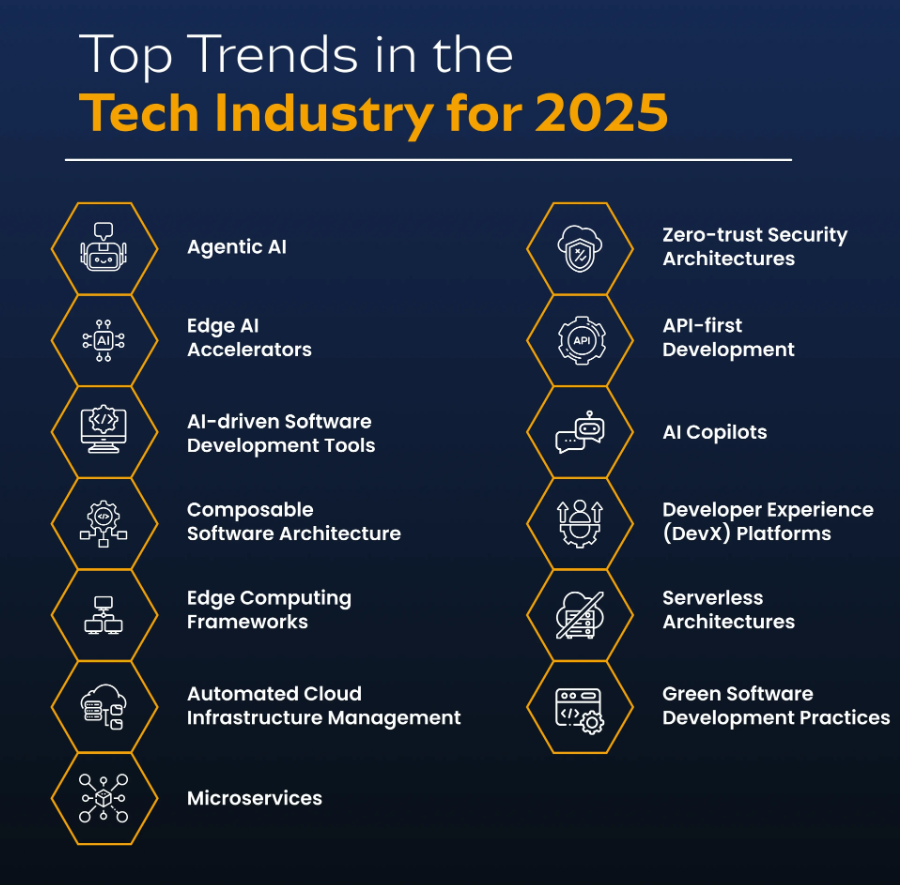1. Agentic AI — Smarter, More Autonomous Intelligence
Agentic AI is steering real-world systems toward autonomy. These systems make decisions, act with minimal human oversight, and adapt in real time. Gartner suggests that by 2028, 15% of daily work decisions could be made without human prompts—up from virtually zero in 2024 Simplilearn.comtalkspirit.comproductiveedge.com. According to Nvidia CEO Jensen Huang, demand for such intelligence will drive computing infrastructure massively in the coming years The Times of India.
2. Spatial Intelligence — AI with Sense & Context
AI is evolving to understand more than just text—it’s learning to interpret physical spaces too. Spatial intelligence enables machines to interact accurately with the world—necessary for augmented reality (AR), robotics, and smarter logistics. These models help robots and AR-enabled devices navigate and interact with physical environments at centimeter-level precision TechRadar.
3. Quantum 2.0 — Beyond the Theoretical
Quantum technology is transitioning from lab talk to practical tools. Innovations like secure quantum encryption and highly accurate quantum-enabled atomic clocks are paving the way for quantum-resilient systems and infrastructure. This emerging tech is poised to revolutionize sectors like cybersecurity, energy, and climate science TechRadar.
4. Smart, Trustworthy Homes — The Next Frontier of Ambient AI
IFA 2025 showcased homes that don't just respond—they anticipate. Expect smarter assistants, improved motion-aware lighting, and AI that operates discreetly—combined with local on-device processing to safeguard your privacy. The game isn’t general intelligence, but a reliable, intuitive, and private smart experience The Verge.
5. Resilient AI Ecosystems — Agents, Synthetic Data & Executive Fluency
In an era marked by volatility—geopolitical tension, regulation shifts, evolving data laws—companies are investing in smarter, more adaptable AI. AI agents are paired with synthetic data to keep privacy intact but performance strong. And empowered, AI-literate leadership ensures strategy aligns with ethics and innovation TechRadar.
6. Biotechnology Breakthroughs — AI Meets Life Sciences
Biotech advancements are surging forward:
- Gene and cell therapies, including CRISPR-based treatments and FDA-approved cell therapies like Abeona’s Zavasky for rare disorders, are becoming more mainstream Wikipedia.
- In agriculture, gene-editing enables climate-resilient crops.
- The food industry sees momentum in cultivated meat and precision fermentation—aiming for sustainable protein sources Wikipedia.
- Industrial biotech is expanding into circular economy applications—bio-based plastics, green chemicals, and carbon-capturing engineered microbes are gaining traction Wikipedia.
Why These Trends Matter — Quick Takeaways
Trend Why It Matters Agentic AI Streamlines workflows; reduces manual decision-making and delays Spatial Intelligence Enables practical AR and robotics, improving automation and user interaction Quantum Technology Prepares infrastructure for the next cyber and analytical capabilities Ambient Smart Living Improves convenience and privacy by embedding intelligence into everyday life Adaptive AI Ecosystems Helps businesses stay resilient in uncertain regulatory and geopolitical climates Biotechnology Advances Blends tech with biology to address health, sustainability, and food security challenges
Final Tune
2025 is not just another year—it's a signal that the fusion of AI, quantum, spatial computing, and biotechnology is redefining how we live, work, and innovate.
Each of these breakthroughs isn’t isolated; they’re interconnected. Agentic AI enables responsive environments; spatial intelligence makes AI useful in real-world contexts; quantum builds the backbone for future-proof security; and biotech ensures life-quality improvements meet sustainability goals.
Stay tuned, adapt smartly—and let the future unfold.



Arifur Rahaman
Good article